外研版小学英语复习的重点词汇和句型
外研版小学四年级英语下册重点句型和短语

在写作中的运用
句型和短语是写作的基础,能够丰富文章表达,提高语言水平。 掌握常见句型和短语,可以帮助学生更准确地表达意思,避免语言错误。 在写作中运用句型和短语,可以使文章更加生动、形象,增强可读性。
通过练习写作,可以加深学生对句型和短语的记忆和理解,提高语言运用能力。
xx
PART FOUR
句型和短语的拓 展
外研版小学四年 级英语下册重点 句型和短语
单击此处添加副标题内容
汇报人:XX
目录
CONTENTS
01 重点句型 02 重点短语 03 句型和短语的运用 04 句型和短语的拓展
xx
PART ONE
重点句型
问候与告别
重点句型:Good morning/afterno on/evening.
重点句型:How are you?
请求与邀请
请求句型:Can you help me? 你能帮我吗? 邀请句型:Would you like to come to my party? 你愿意来参加我的聚会吗? 肯定回答:Yes, I'd love to. 是的,我非常愿意。 否定回答:No, I'm sorry. 抱歉,我不能来。
句型和短语在日常生活交流中非常重要,能够使表达更准确、更流畅。
在外研版小学四年级英语下册中,学生需要掌握一些常用的句型和短语,如“What do you do? ”、“I’m a teacher.”等。
学生应该多练习这些句型和短语,通过模拟对话、角色扮演等方式来提高口语表达能 力。
教师可以在课堂上设置情境,让学生在实际场景中运用这些句型和短语,加深理解和 记忆。
添加标题
常见副词短语:如 “always”、 “never”、 “usually”、
外研社版小学六年级英语上学期复习重点

外研社版小学六年级英语上学期复习重点1. 词汇复
- 复常用动词、名词和形容词。
- 复数字、颜色和家庭成员的词汇。
- 复表示时间和日期的词汇。
2. 句式复
- 复基本的句型结构,包括主语+谓语和主谓宾结构。
- 复使用一般现在时和一般过去时表达过去的经历或事件。
- 复使用一般将来时表达将来的计划或打算。
3. 语法复
- 复不定代词的用法,如some, any, no, every等。
- 复形容词的比较级和最高级形式的用法。
- 复名词的复数形式和所有格的表达方式。
4. 听力理解
- 提高对简单句子和常见词汇的听力理解能力。
- 训练听力时要注意听懂问题的意思,并能根据问题内容给出正确的回答。
5. 口语表达
- 复日常生活中常用的问候语和交际用语。
- 练日常对话,如询问身体状况、表达感受、邀请、道歉等。
6. 阅读理解
- 进一步提高阅读理解能力,理解简单的短文内容。
- 练根据短文回答问题,进行判断和选择。
以上是外研社版小学六年级英语上学期的复习重点,希望能够帮到您。
外研版小学英语重点知识汇总(版)
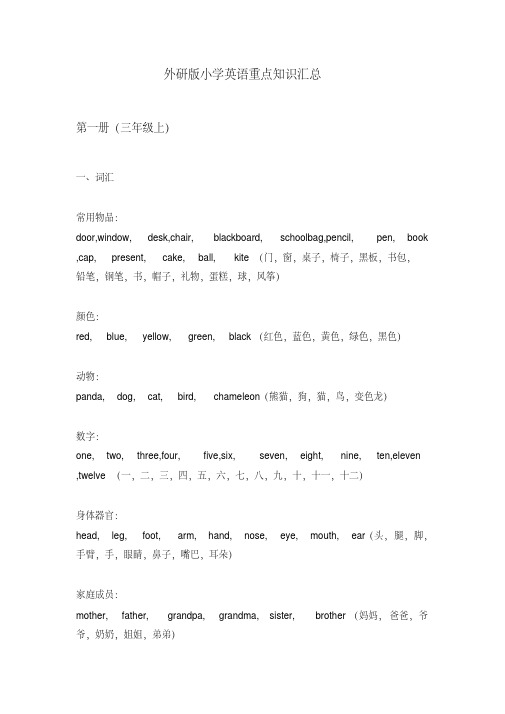
外研版小学英语重点知识汇总第一册(三年级上)一、词汇常用物品:door,window, desk,chair, blackboard, schoolbag,pencil, pen, book ,cap, present, cake, ball, kite(门,窗,桌子,椅子,黑板,书包,铅笔,钢笔,书,帽子,礼物,蛋糕,球,风筝)颜色:red, blue, yellow, green, black(红色,蓝色,黄色,绿色,黑色)动物:panda, dog, cat, bird, chameleon(熊猫,狗,猫,鸟,变色龙)数字:one, two, three,four, five,six, seven, eight, nine, ten,eleven,twelve(一,二,三,四,五,六,七,八,九,十,十一,十二)身体器官:head, leg, foot, arm, hand, nose, eye, mouth, ear(头,腿,脚,手臂,手,眼睛,鼻子,嘴巴,耳朵)家庭成员:mother, father, grandpa, grandma, sister, brother(妈妈,爸爸,爷爷,奶奶,姐姐,弟弟)职业:teacher, pupil, doctor, driver, nurse, farmer, policeman(老师,学生,医生,护士,司机,农民,警察)代词:I, you, it, me, he, she, your, my, his, her, this, that (我,你,它,我,他,她,你的,我的,他的,她的,这个,那个)二、句型1、打招呼及问好:Hello!(你好)Hi!(你好)早上见面说:Good morning.(上午好!)下午见面说:Good afternoon.(下午好!)跟人道别语:Goodbye.(再见)Byebye.(再见)跟人道谢语:Thank you!(谢谢你!)Thanks!(多谢)询问对方的身体情况:----How are you? (你好吗?)----I’m fine, thank you.(我很好,谢谢你。
外研版小学英语册知识点复习及语法

外研版小学英语册知识点复习及语法一、词汇1.数字:从1到100的基础数字,以及相关的词汇如月份、星期几等。
2.常见名词:食物、动物、颜色、家庭成员等。
3. 动词:基本动词如be动词、have动词、go动词等,以及一些常见动作词如run、eat、drink等。
4.形容词:描述事物的特征,如大、小、高、矮、快、慢等。
5.副词:描述动作的方式,如慢慢地、快快地等。
6. 介词:表示方位、时间、原因等,如in、on、under、after等。
7. 代词:主要有人称代词如I、you、he、she等,以及物主代词如my、your、his、her等。
8.句型:句型是句子的基本组成部分,外研版小学英语教材注重句型的学习和练习。
常见的句型有疑问句、陈述句、肯定句、否定句等。
二、语法1. 一般现在时:用于描述事物的常态或经常性动作。
一般现在时的肯定句结构:主语 + 动词原形。
否定句结构:主语 + 动词原形 + not。
疑问句结构:助动词do/does + 主语 + 动词原形。
2. 一般过去时:用于描述过去发生的动作或状态。
一般过去时的肯定句结构:主语 + 动词过去式。
否定句结构:主语 + did not + 动词原形。
疑问句结构:Did + 主语 + 动词原形?3. 现在进行时:用于描述当前正在进行的动作。
现在进行时的肯定句结构:主语 + am/is/are + 动词-ing。
否定句结构:主语 +am/is/are + not + 动词-ing。
疑问句结构:Am/Is/Are + 主语 + 动词-ing?4. 一般将来时:用于描述将来要发生的动作。
一般将来时的肯定句结构:主语 + will + 动词原形。
否定句结构:主语 + will not/won't + 动词原形。
疑问句结构:Will + 主语 + 动词原形?5. 有动词的词组:外研版小学英语教材中还涉及到了一些有特定意义的动词词组,如can、could、shall、should等。
外研社(三年级起)英语三年级下册各单元重点句型汇总
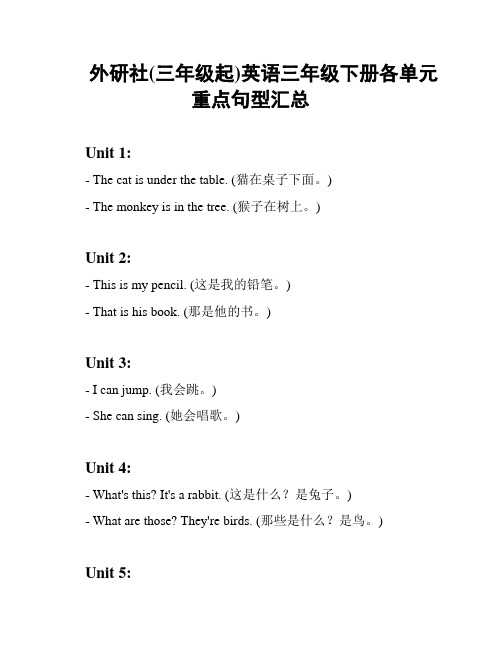
外研社(三年级起)英语三年级下册各单元重点句型汇总Unit 1:- The cat is under the table. (猫在桌子下面。
)- The monkey is in the tree. (猴子在树上。
)Unit 2:- This is my pencil. (这是我的铅笔。
)- That is his book. (那是他的书。
)Unit 3:- I can jump. (我会跳。
)- She can sing. (她会唱歌。
)Unit 4:- What's this? It's a rabbit. (这是什么?是兔子。
)- What are those? They're birds. (那些是什么?是鸟。
)Unit 5:- What do you want? I want a toy car. (你想要什么?我想要一辆玩具车。
)- What does she want? She wants a doll. (她想要什么?她想要一个洋娃娃。
)Unit 6:- Can you swim? Yes, I can. (你会游泳吗?是的,我会。
)- Can he run? No, he can't. (他会跑步吗?不,他不会。
)Unit 7:- I like dogs. (我喜欢狗。
)- She likes cats. (她喜欢猫。
)Unit 8:- Where are you going? I'm going to the park. (你去哪里?我去公园。
)- Where is he going? He's going to the supermarket. (他去哪里?他去超市。
)Unit 9:- I have a new dress. (我有一条新裙子。
)- He has a big balloon. (他有一个大气球。
)Unit 10:- What color is it? It's blue. (它是什么颜色?它是蓝色的。
外研版小学英语(一年级起点)四年级上册四会词及重点句型

四年级上册四会词及重点句型Module 11、重点单词:well好,live居住,tell告诉,warm温暖的,China中国, Chinese中国人2、重点短语:a photo of...的照片,in red 穿红色衣服的,a bit cold有点冷,read a letter 读信,tell me about...讲讲关于...,3、重点语法:①现在进行时,表示正在做某事What are you doing? I am…Be动词(am\is\are)+动词ing 表示在干什么②一般过去时be动词变为was\were 单数用was, 复数用were4、重点句型:It was my birthday on+具体某天(如Saturday)我的生日在...We were at+地点(如the Great Wall)我们在...I’ve(=I have) got a new friend.我有一个新朋友。
He’s(=He has) got short,yellow hair.他有短的、黄色的头发。
Write to me soon. 快给我回信吧。
Thank you for your letter. 多谢你的来信I will be eleven next year. 将来时will be表示将要怎样,Module 21、重点单词:wash-washed 洗,clean-cleaned打扫, finish-finished完成,help-helped帮助cook-cooked 煮,phone-phoned打电话,watch-watched看,paint-painted 绘画shirt衬衣,skirt裙子,trousers 裤子,dirty脏的,2、重点短语:cook noodles煮面条,watch TV看电视,paint a picture 画画,play the flute 吹笛子,listen to music听音乐3、重点语法:一般过去时,表示过去做了某事,变化方式:常规变化v+ed4、重点句型:重点句型:I/He/She +动词过去式...(如I helped my mum.)Module 31、重点单词:talk-talked交谈,homework家庭作业,National Day国庆节,toy玩具(复数+s)on Monday s每周一(每个周一复数),2、重点短语:get up起床,walk to school, play with和...玩耍, ride my bike骑自行车,have English in school 在学校上英语课,play football踢足球,in the park在公园,stay at home待在家,all the rooms全部的房间,talk on the phone 在电话里交谈,3、重点语法:①一般现在时,表示常常习惯做某事,标志词语:every day\usually\often\always\on Mondays(每一个周日),注意第三人称单数要+s\es.I usually+动词原形(如I usually get up at 7’clock.)我通常...He/She+动词s/es....(如She usually gets up at 7’clock.)他、她通常...②一般过去时,didn’t+动词原形,表示过去没有做某事I/He/She didn’t +动词原形....yesterday.(如I didn’t get up at 7’clock yesterday.)我/他/她没有....4、重点句型:I usually ride my bike to the park.But I didn’t ride my bike yesterday.It was raining.昨天下雨了,What a boring day!Module 41、重点单词:paper纸,printing印刷术,print-printed打印,between在...之间,beside在...旁边,单数man-复数men男人,单数woman-复数women 女人,right正确的,clever 聪明的,important 重要的,invent-invented发明,newspapers 报纸,chair 椅子,单数mouse-复数mice 老鼠,bicycle自行车,listen-listened 听2、重点短语:in front of(在...前面),between A and B (在A和B之间)between sth (在两个相同的东西之间)Between the two cars 两辆车之间beside sth (在XX旁边)3、重点语法:准确表示方位巩固过去时的用法4、重点句型:Chinese people invented paper/printing.中国人发明了造纸术/印刷术。
六年级下册英语外研版知识点
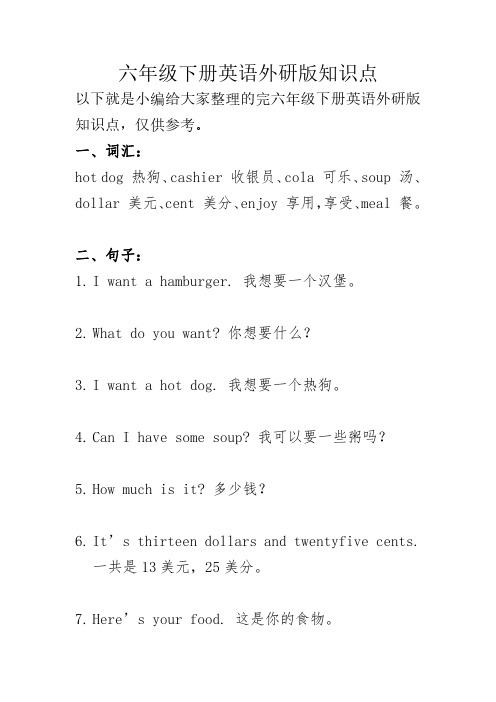
六年级下册英语外研版知识点
以下就是小编给大家整理的完六年级下册英语外研版知识点,仅供参考。
一、词汇:
hot dog热狗、cashier收银员、cola可乐、soup汤、dollar美元、cent美分、enjoy享用,享受、meal餐。
二、句子:
1.I want a hamburger.我想要一个汉堡。
2.What do you want?你想要什么?
3.I want a hot dog.我想要一个热狗。
4.Can I have some soup?我可以要一些粥吗?
5.How much is it?多少钱?
6.It’s thirteen dollars and twentyfive cents.
一共是13美元,25美分。
7.Here’s your food.这是你的食物。
8.What do you want to eat?你想吃什么?
9.I want to eat some meat.我想吃些肉。
以上就是小编给大家整理的外研版六年级下册英语的知识点。
外研版(三起)小学五年级英语上册重点短句和句型汇总

外研版(三起)小学五年级英语上册重点短句和句型汇总第一模块短语:1.in London在伦敦2.be back from从……回来e back回来st Sunday上星期天5.live in住在6.look at看7.ice cream冰激凌e with与……一起来9.hurry up赶快10.wait for等待11.by bus乘坐公交车12.Chinese friends中国朋友句型:一.疑问词(放在句首)when什么时候where在哪里who谁what什么how怎样,如何二.(用什么提问,用什么回答)(疑问句直接回答)1.Did you walk to school?(你步行去学校么?)Yes,I did.No,I didn’t2.Did they go home by bike?(他们骑自行车去学校么?)Yes, they did.No,they didn’t.3.When did you come back with Sam?(你和sam什么时候回来?)I came back with Sam yesterday.(昨天我和sam回来的。
)4.I dropped my ice cream.三、with加某人放在后面。
如:I went to school with Sam.(我同sam去学校)四、过去式:come-came go-went meet-met buy-boughtdrop-droppedRun-ran see-saw walk-walked send(邮寄)-sent eat-ate live-livedHave-had do-did take—took第二模块短语1.shopping list购物单2.how many多少(可数名词复数)3.how much多少(不可数名词)4.half a kilo半公斤5.make a list做一个清单6.one kilo of noodles一公斤面条7、go to the supermarket去超市8、the first thing第一项9、five bottles五瓶10、here you are给你11.all right好吧句型:1.How many+可数名词的复数+did you buy?你买了多少……呢?对可数名词的数量提问。
外研版小学英语知识点总结

外研版小学英语知识点总结外研版小学英语知识点总结生,靠死记硬背会扼杀了孩子的天性和创造力,科学的学习方法应该是从听、说、玩、演、练,全方位的记忆。
下面是店铺为大家整理的小学必备的英语基础知识,希望对大家有用!小学英语知识重点1. 名词所有格名词如要表示与后面名词的所有关系,通常用名词所有格的形式,意为"……的"。
一般有以下几种形式:(1). 一般情况下在词尾加"'s"。
例如:Kate's father Kate的爸爸my mother's friend 我妈妈的朋友(2). 如果复数名词以s结尾,只加"'"。
例如:Teachers' Day 教师节The boys' game 男孩们的游戏(3). 如果复数名词不以s结尾,仍加"'s"。
例如:Children's Day 儿童节Women's Day 妇女节(4). 表示两个或几个共有时,所有格应加在后一个名词上。
例如:Lucy and Lily's room Lucy 和Lily的房间Kate and Jim's father Kate 和Jim的爸爸动物和无生命事物的名词的所有格一般不在词尾加"'s",而常常用介词of的短语来表示。
a map of China 一幅中国地图the name of her cat 她的猫的名字a picture of my family 我的家庭的一张照片the door of the bedroom 卧室的门2. 祈使句祈使句主要用来表示说话人的请求、命令、建议、叮嘱等意图。
祈使句一般不用主语,读时用降调。
为使语气委婉、礼貌,常在句首或句尾加please 。
在句尾时,please前多用逗号。
(1). 祈使句肯定形式的谓语动词一律用动词原形。
新标准外研社三起点小学英语四年级下册M1-M10知识点 期末复习
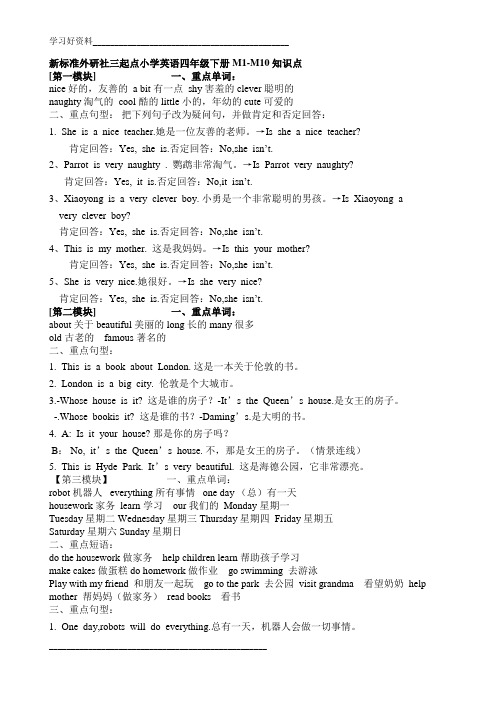
新标准外研社三起点小学英语四年级下册M1-M10知识点[第一模块] 一、重点单词:nice 好的,友善的 a bit 有一点 shy 害羞的 clever 聪明的naughty 淘气的 cool 酷的 little 小的,年幼的 cute 可爱的二、重点句型:把下列句子改为疑问句,并做肯定和否定回答:1. She is a nice teacher.她是一位友善的老师。
→Is she a nice teacher?肯定回答:Yes, she is.否定回答:No,she isn’t.2、Parrot is very naughty . 鹦鹉非常淘气。
→Is Parrot very naughty?肯定回答:Yes, it is.否定回答:No,it isn’t.3、Xiaoyong is a very clever boy. 小勇是一个非常聪明的男孩。
→Is Xiaoyong a very clever boy?肯定回答:Yes, she is.否定回答:No,she isn’t.4、This is my mother. 这是我妈妈。
→Is this your mother?肯定回答:Yes, she is.否定回答:No,she isn’t.5、She is very nice.她很好。
→Is she very nice?肯定回答:Yes, she is.否定回答:No,she isn’t.[第二模块] 一、重点单词:about 关于 beautiful 美丽的 long 长的 many 很多old 古老的 famous 著名的二、重点句型:1. This is a book about London. 这是一本关于伦敦的书。
2. London is a big city. 伦敦是个大城市。
3.-Whose house is it? 这是谁的房子?-It’s the Queen’s house.是女王的房子。
外研版小学英语(一起)四年级下册期末复习知识汇总
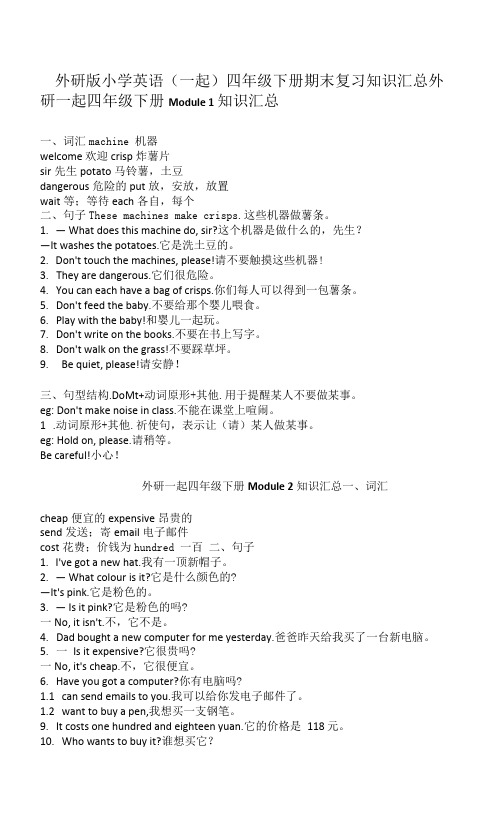
外研版小学英语(一起)四年级下册期末复习知识汇总外研一起四年级下册Module 1知识汇总一、词汇machine 机器welcome 欢迎crisp炸薯片sir先生potato马铃薯,土豆dangerous危险的put放,安放,放置wait等;等待each各自,每个二、句子These machines make crisps.这些机器做薯条。
1.— What does this machine do, sir?这个机器是做什么的,先生?—It washes the potatoes.它是洗土豆的。
2.Don't touch the machines, please!请不要触摸这些机器!3.They are dangerous.它们很危险。
4.You can each have a bag of crisps.你们每人可以得到一包薯条。
5.Don't feed the baby.不要给那个婴儿喂食。
6.Play with the baby!和婴儿一起玩。
7.Don't write on the books.不要在书上写字。
8.Don't walk on the grass!不要踩草坪。
9.Be quiet, please!请安静!三、句型结构.DoMt+动词原形+其他.用于提醒某人不要做某事。
eg: Don't make noise in class.不能在课堂上喧闹。
1.动词原形+其他.祈使句,表示让(请)某人做某事。
eg: Hold on, please.请稍等。
Be careful!小心!外研一起四年级下册Module 2知识汇总一、词汇cheap便宜的expensive昂贵的send发送;寄email电子邮件cost花费;价钱为hundred 一百二、句子1.I've got a new hat.我有一顶新帽子。
2.— What colour is it?它是什么颜色的?—It's pink.它是粉色的。
四上外研版英语知识点总结

四上外研版英语知识点总结
以下是四上外研版英语的部分知识点总结:
1. 词汇:掌握有关学校、家庭、动物、季节等主题的词汇,如“classroom”、“home”、“cat”、“dog”、“spring”等。
2. 语法:学习现在进行时、一般现在时和特殊疑问句等语法知识,了解并列连词“and”和转折连词“but”的用法。
3. 语音:掌握字母组合“ai”、“ay”的发音规则,学习升降调的运用。
4. 阅读:能够读懂简单的英文小故事或短文,理解其中的情节和意义。
5. 写作:能够根据要求写简单的英文短文或信件,正确使用标点符号和大小写字母。
6. 听力:能够听懂语速较慢、发音清晰的英文短文或对话,获取其中的信息和细节。
7. 口语:能够进行简单的日常英语口语交流,如问候、介绍、购物等。
如需完整的四上外研版英语知识点总结,建议查阅教材教辅或咨询专业英语教师。
最新外研版小学英语3-6年级上册重点句型短语复习提纲
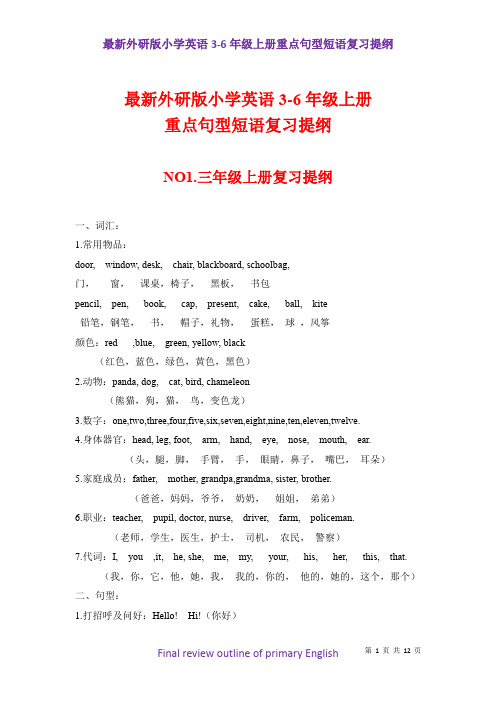
最新外研版小学英语3-6年级上册重点句型短语复习提纲NO1.三年级上册复习提纲一、词汇:1.常用物品:door, window, desk, chair, blackboard, schoolbag,门,窗,课桌,椅子,黑板,书包pencil, pen, book, cap, present, cake, ball, kite铅笔,钢笔,书,帽子,礼物,蛋糕,球,风筝颜色:red ,blue, green, yellow, black(红色,蓝色,绿色,黄色,黑色)2.动物:panda, dog, cat, bird, chameleon(熊猫,狗,猫,鸟,变色龙)3.数字:one,two,three,four,five,six,seven,eight,nine,ten,eleven,twelve.4.身体器官:head, leg, foot, arm, hand, eye, nose, mouth, ear.(头,腿,脚,手臂,手,眼睛,鼻子,嘴巴,耳朵)5.家庭成员:father, mother, grandpa,grandma, sister, brother.(爸爸,妈妈,爷爷,奶奶,姐姐,弟弟)6.职业:teacher, pupil, doctor, nurse, driver, farm, policeman.(老师,学生,医生,护士,司机,农民,警察)7.代词:I, you ,it, he, she, me, my, your, his, her, this, that.(我,你,它,他,她,我,我的,你的,他的,她的,这个,那个)二、句型:1.打招呼及问好:Hello! Hi!(你好)早上见面说:Good morning! (上午好) 下午见面说:Good afternoon! (下午好)跟人道别语:Goodbye! Bye-bye! (再见)跟人道谢语:Thank you ! (谢谢)询问对方的身体情况:How are you? (你好吗?)回答:I’m fine,thank you.(我很好,谢谢。
[全]外研版(三起)小学英语六年级上册知识点归纳总结
![[全]外研版(三起)小学英语六年级上册知识点归纳总结](https://img.taocdn.com/s3/m/f64f5ee9312b3169a551a44a.png)
外研版(三起)小学英语六年级上册知识点归纳总结Module 1一、词汇thousand 一千kilometre 千米,公里map 地图something 某事物,某种东西million 百万right 正确的country 国家二、固定搭配more than 超过in the east 在东部a picture of 一张......的图片in the west 在西部look at 看in the south 在南部三、句子1. That’s really big! 那真大!2. It’s here.它在这里。
3. That’s right.没错。
四、重点句型1. 询问某物长度的句型:-- How long is + 其他?-- It’s + 数字+ 其他.eg:1. -- How long is the Great Wall? 长城有多长?-- It’s more than twenty thousand kilometres. 有两万多公里2. -- How long is the river? 这条河有多长?-- It’s about thirty metres. 大约三十米。
2. 描述某地在哪的句型:地名+ is in the + 方位词+ of + 其他.eg:1. Beijing is in the north of China. 北京在中国的北部。
2. New York is in the east of the US. 纽约在美国的东部。
Module 2一、词汇Dancing 跳舞,舞蹈Chinatown 唐人街,中国城sometimes 有时shop 商店then 既然是这样,那么ah 啊strong 坚固的专有名词:the Changjiang River 长江the Huangshan Mountain 黄山the West Lake 西湖the Great Wall 长城二、固定搭配send an email to... 给......发送电子邮件lots of 许多go to Chinatown 去唐人街Chinese dancing 中国舞蹈三、知识点tell sb about sth 告诉某人关于某事四、重点句型there be 句型(be动词选择采用就近一致原则)eg:There is a cat and lots of big apples on the tree. 树上有一只猫和许多大苹果。
外研版(三起)小学六年级英语上册重点短句和句型汇总
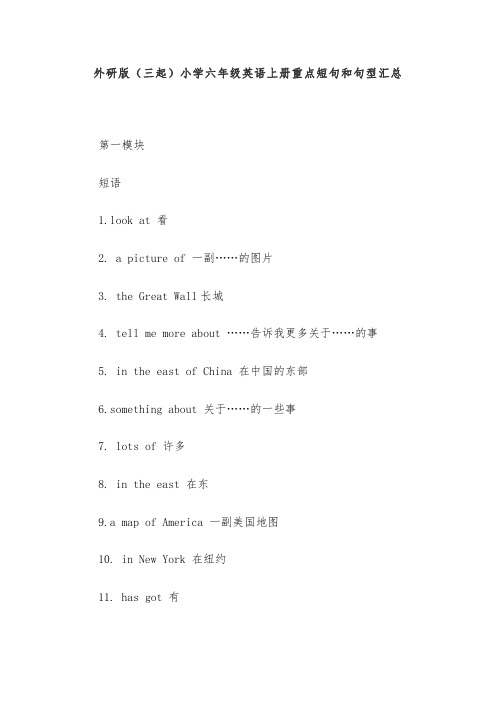
外研版(三起)小学六年级英语上册重点短句和句型汇总第一模块短语1.look at看2.a picture of一副……的图片3.the Great Wall长城4.tell me more about……告诉我更多关于……的事5.in the east of China在中国的东部6.something about关于……的一些事7.lots of许多8.in the east在东9.a map of America一副美国地图10.in New York在纽约11.has got有句型1.How long is it?问长度,用多少米回答2.How big is it?问有多少人口,用具体数字回答。
3.tell me more about……告诉我更多关于……的事。
4.Beijing has got14million people.北京有一千四百万人口。
5.方位名词东east南south西west北northB在A范围里面,用in例:山东在中国东部。
Shandong is in the east ofChina.A与B接壤,用on例:俄罗斯在中国的北部。
6.感叹句What+数量词+形容词+名词!what a big apple!第二模块短语:1.an email.一封电子邮件2.send an email发送一封电子邮件3.miss china想念中国4.Chinatown唐人街5.want to do想要干^6.Chinese restaurants中餐馆7.chinese dancing中国舞蹈8.go to Chinatown去唐人街9.lots of许多、大量的10.the Changjiang river长江11.the Tian’anmen square天安门广场12.riding bicycles to work骑自行车上班13.the West Lake西湖14.the Huangshan Mountain黄山句型1.可数名词单数There is+表示有……不可数名词例:There is an apple.有一个苹果。
外研版小学三至六年级英语语法及重点副词

外研版小学三至六年级英语语法及重点副
词
本文档旨在介绍外研版小学三至六年级英语语法及重点副词。
以下是各年级的语法内容和重点副词的总结:
三年级
语法
- 一般现在时:表示经常性或惯性的动作或状态。
- 基数词:表示数量的词,用来数数。
重点副词
- often:经常地
- sometimes:有时地
- always:总是
- usually:通常地
四年级
语法
- 简单过去时:表示过去发生的动作或状态。
- 比较级:表示两个或多个人或物之间的比较。
- 不规则动词:过去式形式不规则的动词。
重点副词
- yesterday:昨天
- last week:上个星期
- more:更多地
- less:更少地
五年级
语法
- 现在进行时:表示此时此刻正在进行的动作。
- 一般将来时:表示将来要发生的动作或状态。
- 介词短语:由介词、名词或代词构成的短语。
重点副词
- now:现在
- tomorrow:明天
- next month:下个月
- there:那里
六年级
语法
- 定冠词:表示特指的名词前的冠词。
- 不定冠词:表示泛指的名词前的冠词。
- 情态动词:表示说话人的态度、意愿、推测或建议等。
重点副词
- here:这里
- anywhere:任何地方
- should:应该
- must:必须
以上为外研版小学三至六年级英语语法及重点副词的概述。
更多详细的语法规则和副词用法请参考相应的教材或学习资源。
外研版小学英语三起六上知识点梳理

wordModule 1 复习资料一、固定搭配:more than 超过kilometre 千米、公里something 某事物,某种东西ten 10 hundred 100 thousand 1000 ten thousand 10000 million 百万twenty million 两千万map 地图right 正确的country 国家postcards 明信片America 美国American 美国人flag 国旗the West lake 西湖the Great Wall 长城New York 纽约San Francisco 旧金山Houston 休斯顿Tennessee 田纳西州二、重点句型:1.描述某样物品:This photo is beautiful!These postcards are great!Those apples are nice!2.谈论一些其他的信息:Tell me more about it.Can you tell me something about...?3.描述景点的特征或地理位置:It’s in the +方位名词〔north, east, west, south〕+ of How long is the Great Wall?It’s more than twenty thousand kilometres long. It’s in the north of China.Where ‘s the West Lake?It’s in the east of China.4.描述城市的特征或地理位置:How big is New York?It has got more than eight million people. It’s in the east of the US.How big is Beijing?It has got about twenty million people. It’s in the north of China.5.感叹句:E.g.:What’s this?What a big map of the US!Module 2 复习资料一、固定搭配:Chinatown 唐人街、中国城shop 商店restaurant 饭店then 那么strong 巩固的sometimes 有时dancing 舞蹈classroom 教室famous 著名Huangshan Mountain 某某Changjiang River 长江二、重点句型:wordE.g:There ‘s a Chinatown in New York.E.g:Is there a cat? Yes, there is. / No, there isn’t.There is a book on the desk. Are there any fruits? Yes, there are. / No, there aren’t.There is an apple.There are lots of beautiful lakes in China.There is some milk. There are some dolls.2.祈使句:Let’s +动词原形+其他Let’s go to Chinatown now!Let’s make a home library.3.描述现在正在做的事情:What are you doing now?I’m sending an email to my family in China. 标志词:Now/ Listen!/ Look!句子结构:主语+ am/ is/ are+ V-ingModule 3 复习资料一、固定搭配:collect 收集stamp 邮票hobby 爱好doll 洋娃娃bicycle 自行车Canada 加拿大二、重点句型:1.描述某人现在有:(单个人) has got...(多人) have got...I have got some dolls from China.He \ She \It has got lots of books.2.描述某人是否拥有:Have you got any dolls from Japan? Yes, I have. \ No, I haven’t.E.g:I have got long hair.You have got a good teacher.They have got some new books.Amy and Sam have got some pictures.She has got a picture of the Great Wall.Simon has got lots of stamps.The dog has got big eyes.E.g:Have you got any stamps from Canada?Yes, I have. / No, I haven’t.3.Collecting stamps is my hobby.4.询问喜好?What ‘s your hobby?I collect dolls.wordI like riding my bicycle. Reading is my hobby.Flying kites is my hobby.Module 4 复习资料一、固定搭配:flag 国旗Flag Day 纪念日special 特殊的meal 餐sound 听起来football 足球、美式橄榄球race 比赛lantern 灯笼hang 挂、吊fly 飞moon cake 月饼on Thanksgiving Day 感恩节at the Mid-Autumn Festival 中秋节at the Dragon Boat Festival 端午节at the Lantern Festival 元宵节二、重点句型:1.谈论中西方节日:Tomorrow is Flag Day.Thanksgiving Day is my favourite festival.Our favourite festival is the Spring Festival.2.描述在节日里干什么?What do you do on Thanksgiving Day?We always have a special meal.We say “thank you “ for our food, family and friends.3.介绍节日活动:At the Dragon Boat Festival, we go to see the dragon boat race. We eat zongzi. It’s very delicious.At the Mid-Autumn Festival, my mother makes delicious moon cakes. My father likes singing songs about the moon.At the Spring Festival, we have a special family dinner. We eat dumplings.My favourite festival is the Lanterns Festival. It is after the Spring Festival. People eat yuanxiao, hang lanterns and do dragon dances.Module 5复习资料重点词汇:story 故事〔复数stories〕短语:tell a story 讲故事candy 糖果〔不可数〕短语:a box of candy 一盒糖果address 地址〔巧记:ad + dress连衣裙〕French 法语短语:speak French 讲法语age 年龄pen friend 笔友习惯搭配:be from ... = e from 来自speak some English 讲一点英语write emails 写电子write to ... 给... 写信collect stamps 收集邮票write in English/ Chinese 用英文/中文写重点句型:1.Please to meet you! 见到你很高兴!= Nice to meet you! (用于初次见面问候)2.like + V-ing 喜欢做某事I like dancing and painting. / She likes reading and swimming.3.can + V原描述某人具有某种能力.I can speak English. / He can ride the bike.4.Please be my pen friend! 请成为我的笔友!〔祈使句:以V原开头〕Module 6复习资料重点词汇:often 经常〔巧记:of + ten〕difficult 困难的〔反义:easy〕world 世界短语:in the world 在世界上all over the world 全世界knife 餐刀;刀子fork 餐叉;叉子 a knife and fork 一副刀叉Japanese 日语; 日本的〔日本:Japan〕chopsticks (常复) 筷子 a pair of chopsticks 一双筷子Canada 加拿大〔国名〕习惯搭配:live in ... 住在... in the UK 在英国have/ has got 拥有next year 明年a Chinese dragon kite 一只龙风筝 a knife and fork 一副刀叉重点句型:1.It’s + 形+ for ** 对某人来说怎么样It’s difficult for me. / It’s too big for him.2.have/ has got 表达某人有某物I have got a book about the US. / She has got a Chinese kite.3.Have/ Has ... got ... 询问某人是否有...Have you got a book about China? / Has she got any stamps? 4.“and〞肯定句中表并列“or〞否认句中表并列;疑问句中表选择“but〞表转折Module 7复习资料重点词汇:believe 相信短语:believe in 信任its 它的〔后接名词;与his, her, my, our, your 同一类〕get 变得;变成〔后加名词、形容词〕body 身体〔复数:bodies〕snake 蛇bamboo 竹子together 一起短语:live together 住在一起lucky 幸运的〔名词:luck 运气〕flute 笛子短语:play the flute 吹笛子frightened 恐惧的;害怕的习惯搭配:look at 看...in winter 在冬天e out of 从... 出来get frightened 害怕play with ... 和... 玩耍a fantastic present 一份极好的礼物重点句型:1.I don’t believe it! 我简直不敢相信!2.What an interesting DVD! 多么有趣的DVD光盘啊!感叹句:What a/ an + 形+ 名!3.Pandas eat for twelve hours a day. 熊猫一天进食十二小时。
- 1、下载文档前请自行甄别文档内容的完整性,平台不提供额外的编辑、内容补充、找答案等附加服务。
- 2、"仅部分预览"的文档,不可在线预览部分如存在完整性等问题,可反馈申请退款(可完整预览的文档不适用该条件!)。
- 3、如文档侵犯您的权益,请联系客服反馈,我们会尽快为您处理(人工客服工作时间:9:00-18:30)。
外研版小学英语复习的重点词汇和句型一、分类词汇名词:人物boy girl mother father brother sister friend cousin driver dancer pupil teacher policeman nurse farmer doctor Ms Mr动物animal dragon tiger lion elephant monkey panda dog cat bird五官身体部分head eye nose ear mouth hand arm foot leg hair食物food cake rice meat bread noodles soup fish chocolate mango banana apple pear orange peanut sweets biscuit vegetable milk fruit watermelon ice cheese juice coffee tea场所方位classroom class school home farm house road supermarket station park lake sea rivereast west north south国家China England America country 交通工具bike bus train boat plane学科English, Chinese, Math, Science 玩具kite, toy, computer game, doll, jigsaw, chess, ball文具bag pencil pen book时间time today day hour yesterday tomorrow morning afternoon evening weekend spring summer autumn winter January February MarchApril May June July AugustSeptember OctoberNovember DecemberMonday Tuesday WednesdayThursday Friday SaturdaySunday服装hat dress coat T-shirtclothes sweater教室中的物品desk chairdoor window其它名词name present boxbottle song winner Christmastree letter metre kilohomework robot weatherpostcard matter game liferadioCold headache fever动词:运动play football, playbasketball, play table tennis,do morning exercises, goswimming, go cycling, run,high jump, ride, row a boat,系动词am is are was werefeel smell情态动词can need mayshould其它动作want, make, cook,wash, please, draw, thank,think, point to, sit down, stand up, know,help, hope, look see, have, has, like,sing , read, write, draw, learn, listen,hear, say, talk, tell, study, speak, drink,drop laugh, give, visit, catch, dance,carry, live, agree, stop, finish, wait, getup, have breakfast, go to school, go towork, have lunch, go home, have dinner,watch TV, take pictures, go straight on,turn right, turn left, understand, argue,wear,went bought had met ran lost learnt形容词:颜色red blue yellow green blackorange purple pink white天气hot cold warm cool windy sunny心情感觉fine, happy, favorite, hungry,difficult, thirsty sad, bored, angry, tired,sorry其它big small short tall old young newthin fat, great, strong, blind, deafnice shy clever naughty cool cute goodbad carefullong wide interesting beautifulwonderful many much famous quietdangerousbetter, worse, useful, last dear cleanenough副词:疑问副词where when how why其它副词here there now then very up down fast high well badly really hard代词:人称代词I we you he she they it物主代词my our your his her their its mine yours hers his指示代词this that these those不定代词some many much any疑问代词what, whose, How many, How old, who, How much,数词one two three four five six seven eight nine ten eleven twelve thirteen fourteen fifteen sixteen seventeen eighteen nineteen twenty thirty forty fifty sixty seventy eighty ninety hundred 介词:on in under to at past by with冠词:a an the连词:and, but, because, so, than其它:Yes, No, Hello, Goodbye, Thank you, too, Happy birthday, o’clock, Happy New Year, Spring Festival, Children’s Day, Let’s, Excuse me, Sport Day, Good luck, Come on, Of course, The Great Wall,二、重点句型1. Good morning.2. Good afternoon.3. How are you?I’m fine, thank you.And how are you? I’m fine, too.4. What’s your name?My name is Sam. / I’m Sam.5. How many? It’s ten.6. How many boys? Tenboys.7. How many girls? Elevengirls.8. Stand up/ Sit down.9. Point to the door. /window,chair…10. What’s this?It’s a book.11. What’s that?It’s a chair.12. Happy birthday. Thankyou.13. Where’s my present ?It’s in the hatIt’s on the hat.It’s under the hat.14. How old are you?I’m eleven.15. Is it a dog?Yes, it is./ No, it isn’t..16. This is my mother.She’s a teacher.This is my father.He’s a doctor.This is my grandpa.He’s a policeman.This is my grandma.She’s a driver.This is my brother.He’s a farmer.This is my sister.She’s a nur se.It’s me.I’m a pupil.17. This is my hand.This is my nose.This is my mouth.These are my eyes.These are my ears.These are my feet.18. What are they?They are monkeys.Are they tall?No, they aren’t.Are they thin?Yes, they are.19.I like football.I don’t like basketball.I like swimming.I don’t like skipping rope.I like skipping rope.I don’t like cycling.20.What’s your favourite colour?It’s blue.21.Sam likes toy cars.He doesn’t like Barbie dolls.22.Amy likes Barbie dolls.She doesn’t like computer games 23.Do you like noodles?Yes, I do./ No, I don’t.24.Does Lingling like meat?Yes, she does./ No, she doesn’t.25.What’s the time , please?It’s four o’clock.It’s half past three.26.I have breakfast at six o’clock.I go to school at eight o’clock.I have lunch at twelve o’clock.I go home at half past five.I have dinner at half past six.27.What do you do at the weekend?I play basketball.I watch TV.I play football.I play table tennis.I go swimming.28.What does Sam do at the weekend? He plays basketball.He watches TV.He plays football.He plays table tennis.He goes swimming.29.What does Amy do at the weekend? She plays basketball.She watchesTV. She plays football.She plays table tennis.She goes swimming.30.What do you have atschool?At school I have Chinese,Maths, English and Science.31.Happy New Year.32.Happy Christmas.33. SpringIt’s spring.It’s warm in spring.We go cycling in spring.34.SummerIt’s summer.It’s hot in summer.We go swimming in summer.35. AutumnIt’s a utumn.It’s cool in autumn.We play football in autumn.36. WinterIt’s winter.It’s cold in winter.We watch TV and play tabletennis in winter.37.What do you do in spring?I go cycling in spring.What do you do in summer?I go swimming in summer.What do you do in autumn?I play football in autumn.What do you do in winter?I watch TV and play table tennis inwinter.38. How do you go to school?I go to school by bus.(或by train, bycar, by bike)I go to school on foot.I walk to school.39.How does your father go to work?He goes to work by car.How does your mother go to work?She goes to work by bike.40.Have you got a tiger?Yes, I have./ No, I haven’t.Have you got a new sweater?Yes, I have. / No, I haven’t.41.Has he got a new toy plane?Yes, he ha s. / No, he hasn’t.Has she got a new dress?Yes, she has./ No, she hasn’t.42.This is my mother. She’s watchingTV.This is my father. He’s reading a book.This is my grandma. She’s writing aletter. This is my grandpa. He’s taking apicture.43. What are you doing?I’m watching TV.44.Do you want some rice?Yes, please./ No, thank you.45.Have you got chopsticks in England ? Yes, we have./ No, we haven’t.45.What are they doing?They’re rowing a boat.46.Can you jump far?(run fast, jump high, ride fast)Y es, I can./ No, I can’t.46.It’s time to go to bed.47.We’re going to go to Hainan tomorrow.48.What are you going to do for Sports Day?I’m going to run 100 metres.49.Can I have an apple?Yes, you can./ Sorry, you can’t.50.Can I have some soup?Yes, you can./ Sorry, you can’t.51.There is some fish.(不可数名词) There are some sweets. (可数名词) There isn’t any soup. (不可数名词) There aren’t any biscuits. (可数名词) 52.How many birthdays are there in January?There is one. There four. There aren’t any.53.This is Xiaoyong. He’s a clever pupil. He’s very clever.54.This is a book about London. It’s very nice.55.London is the capital ofEngland.56.This the River Thames.It’s very long and very wide.57.This is Big Ben. It’s veryold and very tall.58.This is Hyde Park. It’svery beautiful.59.This is Tower Bridge. It’svery famous and verybeautiful.60.We’re going to have apicnic.61.Will you take a ball?Yes, I will./ No, I won’t.63.What is Amy doing?She’s reading a letter.64.I like playing football.65.I love watching TV.66.I like football andwatching TV.67.Robots will do everything.68.Robots can walk.69.It will be windy in Beijing.70.It will rain in Hanzhou.71.Amy’s taller thanLingling.72.I’m shorter than Daming.73.Beijing is bigger thanTianjin.74.I think this girl is better than the firstgirl.75.Do you agree?76.This boy is worse than that boy.77.Washington D.C is the capital of theUSA.78.People speak English in America.79.I was two then. Now I am ten.80.He was two then. Now he’s ten.81.They weren’t old then. They werevery young.82.Did you help your mother onSaturday? Yes, I did. / No, I didn’t.83.Did Amy help her mother? Yes, shedid. / No, she didn’t.84.Did Daming go to school? Yes, hedid. / No, he didn’t.85.Where did you go? I went to theGreat Wall.86.What did you do yesterday? I playedbasketball.87.What did you see? I saw some bigmountains.88.What did you eat? I ate some bread.89.What did you buy? I bought somepictures.90.Sam had chocolate biscuitsyesterday.Today he’s got a stom achache.91.Amy had a cold yesterday. Todayshe’s got a headache.92.Lingling had a headache yesterday. Today she’s got a fever.93.I’ve got a fever.94.There was a tree.95.There were many trees.96.There wasn’t a chair.97.There weren’t many flowers.98.How many bananas do you want? Five bananas, please.99.How much cheese do you want? Halfa kilo, please.100.It was sunny, so we could play basketball.101.It rained yesterday, so se couldn’t play basketball.102.Is this your cap? Yes, it’s mine./ No, it i sn’t. It’s hers.103.Whose book is this? It’s hers. 104.There is too much rubbish.There aren’t enough sun.There are too many chickens.There isn’t enough food.There are too many children.There aren’t enough chairs.105.I can play football well.106.Can you control the ball?Yes, I can. / No, I c外研版小学英语复习的重点词汇和句型一、分类词汇名词:人物boy girl mother fatherbrother sister friend cousindriver dancer pupil teacherpoliceman nurse farmerdoctor Ms Mr动物animal dragon tigerlion elephant monkey pandadog cat bird五官身体部分head eyenose ear mouth hand armfoot leg hair食物food cake rice meatbread noodles soup fishchocolate mango bananaapple pear orange peanutsweets biscuit vegetable milkfruit watermelon ice cheesejuice coffee tea场所方位classroom classschool home farm house roadsupermarket station park lakesea rivereast west north south国家China EnglandAmerica country交通工具bike bus train boatplane学科English, Chinese,Math, Science玩具kite, toy, computer game, doll,jigsaw, chess, ball文具bag pencil pen book时间time today day hour yesterdaytomorrow morning afternoon eveningweekend spring summer autumn winterJanuary February March April May JuneJuly August September OctoberNovember December Monday TuesdayWednesday Thursday Friday SaturdaySunday服装hat dress coat T-shirt clothessweater教室中的物品desk chair door window其它名词name present box bottle songwinner Christmas tree letter metre kilohomework robot weather postcardmatter game life radioCold headache fever动词:运动play football, play basketball, playtable tennis, do morning exercises, goswimming, go cycling, run, high jump,ride, row a boat,系动词am is are was were feel smell情态动词can need may should其它动作want, make, cook, wash,please, draw, thank, think, point to, sitdown, stand up, know, help, hope, looksee, have, has, like, sing , read, write, draw, learn, listen, hear, say, talk, tell, study, speak, drink, drop laugh, give, visit, catch, dance, carry, live, agree, stop, finish, wait, get up, have breakfast, go to school, go to work, have lunch, go home, have dinner, watch TV, take pictures, go straight on, turn right, turn left, understand, argue, wear,went bought had met ran lost learnt形容词:颜色red blue yellow green black orange purple pink white天气hot cold warm cool windy sunny 心情感觉fine, happy, favorite, hungry, difficult, thirsty sad, bored, angry, tired, sorry其它big small short tall old young new thin fat, great, strong, blind, deafnice shy clever naughty cool cute good bad carefullong wide interesting beautiful wonderful many much famous quiet dangerousbetter, worse, useful, last dear clean enough副词:疑问副词where when how why其它副词here there now then very up down fast high well badly really hard 代词:人称代词I we you he shethey it物主代词my our your hisher their its mine yours hershis指示代词this that thesethose不定代词some many muchany疑问代词what, whose,How many, How old, who,How much,数词one two three four fivesix seven eight nine teneleven twelve thirteenfourteen fifteen sixteenseventeen eighteen nineteentwenty thirty forty fifty sixtyseventy eighty ninetyhundred介词:on in under to at pastby with冠词:a an the连词:and, but, because, so,than其它:Yes, No, Hello,Goodbye, Thank you, too,Happy birthday, o’clock,Happy New Year, SpringFestival, Children’s Day, Let’s, Excuseme, Sport Day, Good luck, Come on, Ofcourse, The Great Wall,二、重点句型1. Good morning.2. Good afternoon.3. How are you?I’m fine, thank you.And how are you?I’m fine, too.4. What’s your name?My name is Sam. / I’m Sam.5. How many? It’s ten.6. How many boys? Ten boys.7. How many girls? Eleven girls.8. Stand up/ Sit down.9. Point to the door. /window, chair…10. What’s this?It’s a book.11. What’s that?It’s a chair.12. Happy birthday. Thank you.13. Where’s my present ?It’s in the hatIt’s on the hat.It’s under the hat.14. How old are you?I’m eleven.15. Is it a dog?Yes, it is./ No, it isn’t..16. This is my mother. She’s a teacher.This is my father.He’s a doctor.This is my grandpa. He’s a policeman.This is my grandma. She’s a driver.This is my brother. He’s a farmer.This is my sister. She’s a nurse.It’s me.I’m a pupil.17. This is my hand. This is my nose.This is my mouth. These are my eyes. These are my ears. These are my feet.18. What are they? They are monkeys.Are they tall?No, they aren’t.Are they thin?Yes, they are.19.I like football.I don’t like basketball.I like swimming.I don’t like skipping rope.I like skipping rope.I don’t like cycling.20.What’s your favouritecolour?It’s blue.21.Sam likes toy cars.He doesn’t like Barbie dolls.22.Amy likes Barbie dolls.She doesn’t like computergames23.Do you like noodles?Yes, I do./ No, I don’t.24.Does Lingling like meat?Yes, she does./ No, shedoesn’t.25.What’s the time , please?It’s four o’clock.It’s half past three.26.I have breakfast at sixo’clock.I go to school at eighto’clock.I have lunch at twelveo’clock.I go home at half past five.I have dinner at half past six.27.What do you do at theweekend?I play basketball.I watch TV.I play football.I play table tennis.I go swimming.28.What does Sam do at the weekend?He plays basketball.He watches TV.He plays football.He plays table tennis.He goes swimming.29.What does Amy do at the weekend?She plays basketball.She watchesTV.She plays football.She plays table tennis.She goes swimming.30.What do you have at school?At school I have Chinese, Maths,English and Science.31.Happy New Year.32.Happy Christmas.33. SpringIt’s spring.It’s warm in spring.We go cycling in spring.34.SummerIt’s summer.It’s hot in summer.We go swimming in summer.35. AutumnIt’s autumn.It’s cool in autumn.We play football in autumn.36. WinterIt’s winter.It’s cold in winter.We watch TV and play table tennis in winter.37.What do you do in spring?I go cycling in spring.What do you do in summer?I go swimming in summer.What do you do in autumn?I play football in autumn.What do you do in winter?I watch TV and play table tennis in winter.38. How do you go to school?I go to school by bus.(或by train, by car, by bike)I go to school on foot.I walk to school.39.How does your father go to work? He goes to work by car.How does your mother go to work? She goes to work by bike.40.Have you got a tiger?Yes, I have./ No, I haven’t.Have you got a new sweater?Yes, I have. / No, I haven’t.41.Has he got a new toy plane? Yes, he has. / No, he hasn’t.Has she got a new dress?Yes, she has./ No, she hasn’t.42.This is my mother. She’swatching TV.This is my father. He’sreading a book.This is my grandma. She’swriting a letter. This is mygra ndpa. He’s taking apicture.43. What are you doing?I’m watching TV.44.Do you want some rice?Yes, please./ No, thank you.45.Have you got chopsticksin England ?Yes, we have./ No, wehaven’t.45.What are they doing?They’re rowing a boat.46.Can you jump far?(runfast, jump high, ride fast)Yes, I can./ No, I can’t.46.It’s time to go to bed.47.We’re going to go toHainan tomorrow.48.What are you going to dofor Sports Day?I’m going to run 100 metres.49.Can I have an apple?Yes, you can./ Sorry, you can’t.50.Can I have some soup?Yes, you can./ Sorry, you can’t.51.There is some fish.(不可数名词)There are some sweets. (可数名词)There isn’t any soup. (不可数名词)There aren’t any biscuits. (可数名词)52.How many birthdays are there inJanuary?There is one. There fo ur. There aren’tany.53.This is Xiaoyong. He’s a clever pupil.He’s very clever.54.This is a book about London. It’svery nice.55.London is the capital of England.56.This the River Thames. It’s very longand very wide.57.This is Big Ben. It’s very old andvery tall.58.This is Hyde Park. It’s very beautiful.59.This is Tower Bridge. It’s veryfamous and very beautiful.60.We’re going to have a picnic.61.Will you take a ball?Yes, I will./ No, I won’t.63.What is Amy doing?She’s reading a letter.64.I like playing football.65.I love watching TV.66.I like football and watching TV.67.Robots will do everything.68.Robots can walk.69.It will be windy in Beijing.70.It will rain in Hanzhou.71.Amy’s taller than Lingling.72.I’m shorter than Daming.73.Beijing is bigger than Tianjin.74.I think this girl is better than the first girl.75.Do you agree?76.This boy is worse than that boy.77.Washington D.C is the capital of the USA.78.People speak English in America.79.I was two then. Now I am ten.80.He was two then. Now he’s ten.81.They weren’t old then. They were very young.82.Did you help your mother on Saturday? Yes, I did. / No, I didn’t.83.Did Amy help her mother? Yes, she did. / No, she didn’t.84.Did Daming go to school? Yes, he did. / No, he d idn’t.85.Where did you go? I went to the Great Wall.86.What did you do yesterday? I played basketball. 87.What did you see? I sawsome big mountains.88.What did you eat? I atesome bread.89.What did you buy? Ibought some pictures.90.Sam had chocolatebiscuits yesterday.Today he’sgot a stomachache.91.Amy had a cold yesterday.Today she’s got a headache.92.Lingling had a headacheyesterday. Today she’s got afever.93.I’ve got a fever.94.There was a tree.95.There were many trees.96.There wasn’t a chair.97.There weren’t manyflowers.98.How many bananas doyou want? Five bananas,please.99.How much cheese do youwant? Half a kilo, please.100.It was sunny, so wecould play basketball.101.It rained yesterday, so secouldn’t play basketball.102.Is this your cap? Yes, it’smine./ No, it isn’t. It’s hers.103.Whose book is this? It’s hers.104.There is too much rubbish.There aren’t enough sun.There are too many chickens.There isn’t enough food.There are too many children.There aren’t enough chai rs.105.I can play football well.106.Can you control the ball?Yes, I can. / No, I can’t.107.This man is blind. He cannot see .He cannot walk well by himself. Thisdog helps him.108.This girl is deaf. She cannot hearwell by herself. This dog helps her.109.These firemen cannot find peopleby themselves. But these dogs help them.110.What time do you get up? I get up athalf past six.111.Are you feeling happy? Yes, I am. /No, I’m not.112.You should look. Then cross theroad.113. You shouldn’t walk i n the road.114.Should he do his homework? Yes,she should.115.Should she watch TV? No, sheshouldn’tan’t.107.This man is blind. He cannot see .He cannot walk well by himself. This dog helps him.108.This girl is deaf. She cannot hear well by herself. This dog helps her. 109.These firemen cannot find people by themselves. But these dogs help them. 110.What time do you get up? I get up at half past six.111.Are you feeling happy? Yes, I am. / No, I’m not.112.You should look. Then cross the road.113. You shouldn’t walk in the road. 114.Should he do his homework? Yes, she should.115.Should she watch TV? No, she shouldn’t。
